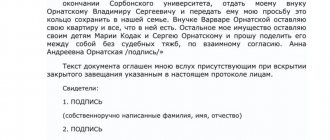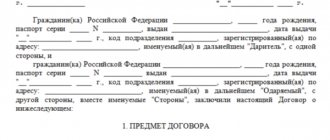1
A will is a written expression of the will of a citizen, in which he leaves instructions about his property in the event of death. The document is subject to notarization. It can be issued by any citizen over the age of 18 , endowed with full legal capacity. However, during his lifetime, the testator has the right to rewrite the document as many times as he likes. Until the death of the owner, the text is not valid. Let's look at when a will comes into effect after death.
Features of the entry into force of the document
Having a problem?
Call a lawyer: Moscow and Moscow region (free call) St. Petersburg and Leningrad region
How long does it take for a will to come into force? This happens immediately after the death of the testator. You can receive all rights due after the probate of the will is completed and only if you have a death certificate. To carry out the procedure, you will need to draw up an application according to the accepted sample. The following documents are attached to it:
- Death certificate;
- Passport of the recipient of the property;
- Certificate of residence;
- Papers that testify to the family ties of the testator and heirs.
The time frame for the entry into force of the document is limited and is 6 months. If, during this time, the heir has not applied to the notary's office, he will have to obtain the consent of other heirs to acquire rights under the will. If consent cannot be obtained, the matter is resolved through a judicial authority. To initiate the procedure, you need to draw up a statement of claim. Consent also requires compliance with certain conditions. This is the presence of a notary when drawing up a document. The second option is to have the signatures of the heirs certified by a notary.
The lengthy procedure for acquiring rights takes place during court proceedings. The court establishes that there are valid reasons why the established deadlines for entering into inheritance have been missed.
Who can certify a will?
The norms of the Civil Code of the Russian Federation clearly list the entities that can certify wills. This gives acts of will a legitimate status.
Depending on the situation, the persons certifying the will are:
- heads of local government bodies, specialists of the compulsory health insurance service (CHI) - in settlements where there is no notary office;
- chief doctors, their deputies, performing duties under the relevant order, doctors on duty - in hospitals and other medical institutions;
- directors, doctors on duty - in boarding schools, nursing homes;
- captains - on Russian ships;
- commanders of military units;
- heads of places of serving sentences;
- heads of field bases and expeditions;
- authorized employees - in banking institutions;
- when drawing up an administrative act in force majeure conditions, it will be witnessed by two people chosen by the testator at random.
Documents certified by the listed entities will be valid if the testator was in the specified place at the time of their execution.
Features of the entry into force of the document
How long does it take for a will to come into force? This happens immediately after the death of the testator. You can receive all rights due after the probate of the will is completed and only if you have a death certificate. To carry out the procedure, you will need to draw up an application according to the accepted sample. The following documents are attached to it:
- Death certificate;
- Passport of the recipient of the property;
- Certificate of residence;
- Papers that testify to the family ties of the testator and heirs.
The time frame for the entry into force of the document is limited and is 6 months. If, during this time, the heir has not applied to the notary's office, he will have to obtain the consent of other heirs to acquire rights under the will. If consent cannot be obtained, the matter is resolved through a judicial authority. To initiate the procedure, you need to draw up a statement of claim. Consent also requires compliance with certain conditions. This is the presence of a notary when drawing up a document. The second option is to have the signatures of the heirs certified by a notary.
Consequences of missing the deadline for accepting an inheritance
Since the validity of a will after the death of the testator is limited to 1/2 year, the heir should declare himself as soon as possible. The fact is that if you miss the deadline, you will have to prove your right to inherit property under a will.
If the heir does not contact the notary in a timely manner, the inheritance will be distributed among the heirs according to the law of the corresponding line of inheritance. Among the first to claim the property of the deceased are:
- legal spouse who survived the deceased;
- children, and if they die before the testator - his grandchildren;
- parents.
Brothers and sisters, grandparents are called upon to inherit in order of the second priority and only if none of the primary heirs has declared themselves.
There are 7 inheritance queues in total. And if none of the heirs legally applies for the inheritance, or is deemed unworthy, or for other reasons does not accept the inheritance, the property of the deceased will go to the municipality as escheat (Article 1151 of the Civil Code of the Russian Federation).
Of course, the heir under the will will be able to claim his rights to the property by judicially restoring the period for accepting the inheritance. But even if the court recognizes the pass as valid, problems cannot be avoided.
The heir under a will has the right to claim the property due from the heir who received the inheritance within the framework of the corresponding line of inheritance. But if he sells the property, then it will no longer be possible to return the apartment or land plot. The new owner is considered a bona fide purchaser, and therefore is not obliged to return anything.
If an apartment or other real estate has been transferred to the municipality, it will be returned provided that it has not yet been transferred to new residents under a social tenancy agreement. If the contract has already been drawn up, then nothing can be done.
Therefore, the heir under the will will have to demand compensation, the amount of which is determined by the market value of the property at the current moment. But this does not mean that you will be able to quickly receive the required compensation. Such enforcement proceedings last for years.
Effective time
The will comes into force simultaneously with the opening of the inheritance, that is, from the date of death of the testator. From this moment, the appointed successors have the opportunity to accept the property, rights and obligations determined for them by the testator during his lifetime.
The date of opening of the inheritance is confirmed by the date indicated in the medical report and subsequently in the death certificate. If there is no such information (the body of the testator was not found), the day of his death is established by the court. This happens when:
- the testator did not appear at his place of residence and his family members did not hear anything about him for five years;
- six months have passed since he disappeared under life-threatening circumstances;
- the serviceman did not return to his place of residence and did not make himself known in any way from the day he disappeared and after two years had passed from the end of hostilities.
It is important for heirs to remember that the validity period of a document is limited to six months from the date of death of its originator. After this period, the inheritance is considered not accepted and the rights to it are transferred to the designated successors, distributed among those who have already registered the property of the deceased or those who in this case acquire the possibility of inheriting by law
The period can be extended only if the omission was made for valid reasons, and the “unpunctual” citizen will be able to prove this to the court. Or rely on the goodwill of the remaining heirs, who, after registering their rights, will give unanimous permission to include the late successor in their circle.
Leave a comment on the document
Do you think the document is incorrect? Leave a comment and we will correct the shortcomings. Without a comment, the rating will not be taken into account!
Thank you, your rating has been taken into account. The quality of documents will increase from your activity.
| Here you can leave a comment on the document “Will (option 2)”, as well as ask questions associated with it. If you would like to leave a comment with a rating , then you need to rate the document at the top of the page Reply for |
Legislation on inheritance by will
The laws of Russia protect the interests of all citizens. The Civil Code states that the will of the owner in relation to the will has exclusive power, which allows one to dispose of the property by appointing legal successors. The main condition is to give legal force to the expression of will itself. This requires mandatory attributes, the signature of the testator and certification by a notary. A will loses legal force in the following cases:
- The document does not contain the signature of the testator or was compiled without his personal participation.
- The notary's autograph and the original seal of the notary's office are missing.
- It was established that at the time of execution the testator was incompetent due to age or due to the presence of nervous and mental disorders.
- The inheritance is transferred to a person who does not have the right to accept it if it is proven in court that he is unworthy.
In other cases, the will has exclusive force, canceling the inheritance order.
An exception is the allocation of a mandatory share, which may be claimed by minor children, dependents, and disabled parents. When a will comes into force after the death of the guardian, a citizen who has been a dependent for more than a year receives ½ of the amount assigned to the primary heirs. Moreover, the right of compulsory share has priority. In this case, the remaining part is transferred by will.
Will: basic provisions
If a will comes into force, after the death of the owner, the claims of the relatives become invalid. But at the same time, the latter should not be indicated in the text as legal successors. The heirs submit a corresponding application to the notary office that opened the inheritance case. Six months are allotted for this from the moment of death. However, a will does not revoke the right to receive an obligatory share.
The text may suggest the transfer of the entire hereditary mass or part of it. Even specific objects can be transferred to specified persons. And the case when the successor died without using the power of inheritance can also be prevented. The sub-inheritance procedure involves specifying a “spare” heir who will become the owner in such a situation.
When the will comes into force, the successors will be able to receive:
- real estate (apartments, houses, garages, dachas, etc.);
- movable property (cars, motorcycles);
- cash deposits, securities;
- claims and debts.
After the death of the testator, creditors have the right to demand repayment of the testator's debt obligations.
By questioning the legal validity, it will be possible to achieve the annulment of the will. This is possible if the will was drawn up with violations. Missing entry deadlines is also not a problem if you file a claim in the district court. You will have to indicate valid reasons for absence and document them. As a result, the judge will grant an additional 3 or 6 months for the re-probate case.
Types of wills
Despite the fact that any registration procedure requires personal participation and certification, a document that can be:
- Closed. After sighting, the paper is packed into an envelope, which retains its integrity until opened.
- Compiled under emergency circumstances.
- Conditional. That is, the testator determined mandatory actions, failure to perform which leads to the loss of legal rights. strength.
Regardless of whether the will has special conditions, the drafting procedure is always identical.
Procedure for issuing an order
A single instruction contains the following steps:
- Determine what can be passed on by inheritance. Remember that you can only write into a will what officially belongs to a person.
- Choose one or more successors, distribute the values between them. Think about the fact that the will loses force if the heir dies before joining.
- Designate sub-hereditary successors who will take over the property if the main candidates refuse or are unable to assume ownership rights.
- Remember what conditions applicants must fulfill in order to enter into the right of inheritance (take care of an animal, provide for a dependent, etc.).
- Contact a lawyer who specializes in probate matters for advice. Explain all the conditions that must be included in the will for it to take effect.
- Collect the package of necessary documentation. The list is different in each case, but a lawyer can help in this matter.
- Appear at the notary office at your place of residence, having previously paid the state fee. Attach the receipt to the documentation.
- Sign the will, ensure that the notary notarizes the will and packs it in an envelope. Witnesses put signatures on it, accepting the obligation to maintain secrecy.
How much to pay depends on the range of services and tariffs indicated in the price lists of the legal and notary offices.
Required documents
A civil passport is presented as identification. If an apartment is transferred under a will, a registration mark is not enough. It is necessary to confirm that the testator is the sole owner. Otherwise, a paper defining the share of participation is presented.
This could be a privatization document, a purchase and sale agreement, a deed of gift, etc. The main thing is to confirm that the property was acquired legally. Legal force arises if the papers are drawn up in accordance with current legislation. In a situation where a will is drawn up by a citizen who has a vehicle, it is necessary to bring a title. Documents can also be used to determine the circle of heirs.
The successor's passport is not required. A unilateral transaction will be valid if the legal successor is identified. To do this, indicate his last name, first name, patronymic, and date of birth. Passport series and number are desirable, but not required. Indicate family ties, official registration address and other identifying information so that there are no discrepancies when the will comes into force. A lawyer will help with this.
Expenses
The amount depends on various factors. The main costs are state fees that will have to be paid in order to enter into inheritance rights. When registering a will, the fee is standard. You can find out by phone or on the website of the notary office. Another thing is the expenses of the heirs. Close relatives, in order to enter into an inheritance, will have to transfer 0.3% of the total amount, and for people not included in the first place, the rate doubles and amounts to 0.6% of the value of the property.
You must have enough funds to pay for the services of a notary and lawyer. It will not be possible to ignore these two authorities. The presence of errors and inaccuracies leads to the loss of legal force, and the absence of notarization invalidates the will. Keep in mind that debts associated with inherited property will fall on the shoulders of the successors. It makes sense to pay off debt on utility bills and eliminate overdue loans.
It is advisable to mention debt liability in the text so that meeting the creditors does not come as a surprise. A decision to relinquish property must be made before the inheritance is formalized. Otherwise you will have to spend money. Knowing how much money needs to be paid to remove the encumbrance, the heirs will be able to properly dispose of the property, which will provide their family with enough money for a normal life.
How to inherit by will
Many heirs are concerned about the question of when a will comes into force after the death of its maker. A testamentary disposition becomes effective the day after one of the following events:
- death of the testator;
- recognition of the testator as deceased in court;
- removal or refusal of the right of inheritance of those successors who must divide the property by law;
- the birth of an heir who was conceived during the life of the testator.
This is a standard document drawn up by the testator with mandatory notarization. If a citizen for some reason cannot draw up a document, the notary writes down the information from his words and then reads the text aloud. If it suits the testator, the will is certified.
In what cases is it not necessary to restore the deadline for accepting an inheritance?
Since Art. 1153 of the Civil Code of the Russian Federation determines the possibility of actually accepting an inheritance; the will will be valid a year later, and 5 and 7 years after the death of the testator.
According to the position of the Supreme Court, the issuance of a certificate of the right to inheritance, as well as the state registration of inherited property (if it is subject to state registration) are the right and not the obligation of the heir.
Subject to the provisions of Art. 1152 of the Civil Code of the Russian Federation, an accepted inheritance belongs to the heir from the date of opening of the inheritance. Therefore, the main thing is to have time to take steps to actually accept it within 6 months from the date of opening of the inheritance.
If the heir decides to dispose of the acquired property - sell, exchange, donate, bequeath or use as collateral, he will have to confirm the fact of acceptance of the inheritance.
It will be enough to provide the notary with evidence of actual acceptance of the inheritance. For this purpose, documents are used, from which it follows that the heir:
- paid the debts of the testator;
- received money on behalf of the testator after his death;
- incurred expenses in relation to the testator's property;
- took measures to ensure the safety of property transferred by inheritance;
- owns, uses and manages inherited property.
Important! If the notary doubts the evidence presented, the fact of acceptance of the inheritance will have to be proven in court. Before going to court, you must submit the collected documents to an inheritance law lawyer. He will determine their legal status for the court. If necessary, the lawyer will independently collect the necessary package of documents and evidence.
What legal force does an inheritance will have?
But it is important to take into account that he does not have the right to deprive compulsory heirs of their inheritance. These include minor children of the testator, as well as incapacitated relatives, spouses who were dependent on the testator before the death of the latter;
- A person has the right to dispose of not only the property that he has at the time of writing, but also that which he will acquire during his lifetime in the future;
- The document may name a designated successor for an heir who may have passed away by the time the will takes effect.
The testator has the right to cancel the concluded transaction at any time, without giving any reasons, by contacting a notary. In the same way, he has the right to make any changes to it. The main thing is that this should happen solely by his will.
Pros and cons of a will for an apartment
Moreover, the validity of the will cannot extend to this share. For 2021, such a mandatory share is due to the following persons: Relatives on the ascending line Disabled parents, as well as dependents Relatives on the descending line Children who are under 18 years of age and disabled children (who have been disabled since childhood) In this case, inheritance is not even required to receive a share contest a will. This point is discussed in detail in the current legislation.
Important
Regulatory framework All questions regarding inheritance by will are discussed in detail in Chapter No. 62 of the Civil Code of the Russian Federation. If possible, before filing an application with the court, you should carefully review all NAPs. This will allow you to independently monitor compliance with your rights, avoid major problems, as well as their violation.
Entry into force of the will
- basic concepts;
- who has the right;
- normative base.
Basic concepts Today, the very issue of inheritance, as well as drawing up a will, and other issues related to the transfer of property rights, are fully reflected in special legislative documents. But to obtain the most accurate and detailed information on this matter, you will need to carefully study the main terms used in this case. The list of standard concepts that are best understood in advance includes:
- inheritance by law;
- inheritance queue;
- will;
- heir;
- inheritance.
Directly, the concept of “inheritance by law” refers specifically to the transfer of ownership rights to any specific property after the death of a citizen without a will.
When does a will come into effect after death?
Info Home / Inheritance / When does a will come into force after death? Content
- 1 Legislation on inheritance by will
- 2 Will. Basic provisions
- 3 When does a will come into force after death? 3.1 Closed will. Features of drafting and entry into force
- 3.2 Will made in emergency circumstances
One of the most significant provisions of inheritance law concerns the timing of inheritance.
Heirs are interested in the question of when the will comes into force and when they can begin to register ownership of the inherited property. In this article we will look at the timing of inheritance under a will.
Important aspects of inheritance law: when does a will come into force?
Methods of acceptance The Civil Code of the Russian Federation establishes a clearly defined period during which the heirs have the right to contact a notary to receive an inheritance. To do this, you must submit an application or perform the actions specified in the will, which will be equivalent to entering into an inheritance. Here you can apply for acceptance of inheritance.
The following documents must be attached to the application:
- death certificate of the testator;
- heir's passport;
- certificate from place of residence;
- a document confirming the relationship between the heir and the testator.
This means that you can enter into an inheritance in two ways:
- by submitting an application to a notary at the place of residence of the testator;
- actually accept the inheritance.
It is necessary to enter into the right of inheritance within six months from the date of the death of the testator.
Who can challenge a will for an apartment that has entered into force and how to do it?
In accordance with them, ownership rights are transferred after the death of the owner of the property or in the event of his being declared missing in court. This type of inheritance is the most common. But it often happens that the owner of the property, for some reason, wants to independently distribute the property after his death. In this case, the solution will be to draw up a special will.
Attention
When a will comes into force after the death of the owner of the property
Many see discrepancies in the legislation on this issue. On the one hand, such a transaction comes into force immediately after the signing of the testamentary agreement. On the other hand, the property cannot be used until the testator dies. Even after this, the inheritance should remain intact for another six months if the plans are to sell it, exchange it, donate it, or bequeath it to one’s descendants.
In order for the distribution to occur fairly, it is necessary to form the full volume of the inheritance mass. All heirs are also wanted. Determine the presence of obligatory successors. All procedures take 6 months. During this period, after the will is announced and comes into force, the successors receive notices and write applications to enter into the inheritance.
The moment of entry into force can be delayed or brought forward. A reduction in terms is possible if, apart from the person indicated in the will, there are no applicants for receiving the property. Extension – consequences of filing a corresponding claim. This procedure is necessary for people who accidentally missed the opportunity to become the owner of property. An application written after a six-month period is not valid and will not be accepted for consideration. We have to act through the courts.
Features of the entry into force of the document
One of the features is a formal approach to deadlines. For different situations, methods for solving the problem associated with delay are different. But you can always ask a lawyer your question, and for free. All you need to do is call or contact us online on the legal advice website. The will comes into effect for the heirs on the day the will is opened.
The procedure lasts six months, if we talk about the general terms of entry. When the applicant is unable to get to the notary's office on time, you can send a letter. The difficulty is due to the fact that you need to contact a notary who is located at the place of registration of the now deceased, and this may be far away. Do the following:
- Gather the necessary documents confirming the right to claim.
- Come to the nearest office, check the account number, pay the state fee.
- Submit an application to accept the inheritance under the will and have the signature notarized.
- Send a registered letter with a list of attachments and a confirmation of delivery.
The envelope must contain all attached documentation. In this case, the date of entry into force of the application is considered to be the day of sending, not receipt. By indicating in the text of the appeal that you need to extend the deadline, you can do this without going to court. Otherwise, a claim is filed.
Features of the entry into force of a will for an apartment
Often, the testator gives power to the heir who lived in the inherited apartment during his lifetime. In this case, you can act without involving a notary. Get a copy of the will, prepare documents, write a statement. But you need to take the papers to local authorities. In this case we are talking about actual entry. The procedure has the same force as a notary deed.
A prerequisite is cohabitation. It is important that the heir specified in the will pays for the apartment during his lifetime, maintains it in proper condition, and spends money on repairs and furnishings. Receipts, checks, invoices are evidence of these expenses and must be attached to the official application. If there are no other claimants, the will will come into force after 3 months.
After this, you need to re-register the property in your name. To do this, contact Rosreestr. In order for the appropriate marks to appear in the registry, pay off your utility debts, if any. The presence of debts is the reason for refusal of registration. And this is necessary, because without being the official owner, you will not be able to sell the apartment, donate it, exchange it, or leave it to your descendants.
Nuances of the entry into force of closed wills
This is a guarantee that the conditions described in the document will not be disclosed ahead of time. The paper is drawn up in front of witnesses, certified, and packaged in an opaque envelope. The gluing areas are “sealed” with the signatures of witnesses and a notary. In this form, the will remains in force until it is opened, subject to absolute confidentiality. But the main thing is that if information leaks, the testator has the right to demand financial compensation.
To do this, a claim is filed specifying the amount of monetary compensation for moral inconvenience. The problem is that Russian legislation on this issue is not fully formed, and the cost of the claim must be set carefully. The judge, at his own discretion, may reduce the amount or cancel it completely if the amount of compensation is biasedly inflated.
What the law says: how it is regulated
The main provisions for receiving an inheritance are regulated by the Civil Code, Chapter 3. Some provisions from the Federal Law “On Notaries” are also additionally applied.
If there is a will, then the distribution of the inheritance will occur as indicated by the testator in the document, but the requirements of the Civil Code of the Russian Federation regarding compulsory heirs will also be taken into account: these are the children, parent and spouse of the deceased. If through the court they are not found unworthy, then, regardless of the distribution of property in the will, they have the right to receive half of the share that would be due to them by law, that is, half of the half.
How to cancel or make changes
Civil Code in Art. 1130 establishes the rule according to which a will can be revoked or changed at any time. There is no need to provide a reason. There are two ways to change and cancel:
- Drawing up a new will (when written, it directly indicates the cancellation of the old document. If there is no such indication, then the original one is changed in a contradictory part).
- Cancellation order (made in writing; a new order is not drawn up, but the old one is cancelled).
The procedure itself is similar in nature to the preparation of the original document. Notarization required. The amount of the duty and notary fee does not change and is 100 rubles. with additional payment for technical and legal services.
Challenging a closed will
A secret order is challenged in the following situations:
- Failure to comply with the law during the procedure.
- Drawing up an administrative act by another person.
- Incapacity of the testator.
- Errors and inaccuracies in the text.
Heirs whose rights are considered to have priority - disabled parents, the testator's spouse, dependents, minor children - have the right to challenge a closed will.
Procedure
Challenging involves filing a claim in court. The procedure for canceling a document is available for 3 years if there is evidence of the incapacity of the testator or violations during registration.
The period for annulment established in the event that it is revealed that a closed will was drawn up under the influence of threats and blackmail is 1 year. The plaintiff must prove his own case by presenting conclusive evidence.
Is it possible to make a will without a notary?
It is possible to write a will without a notary that will be legally valid in cases regulated in the Civil Code:
- When making closed testamentary dispositions. Closed wills are understood as wills that testators draw up personally without the presence of strangers in secrecy. They are drawn up in handwritten form; the use of printed media is not acceptable. Such a document in a single copy, sealed in an envelope, in the presence of two witnesses, is handed over to a notary for safekeeping. All responsibility for the correctness and literacy of the content falls on the testator.
- There is no notary at the testator's location. This situation is typical for small settlements where notary offices are not organized, as well as places of military service and prisons. The list includes vessels at sea and areas where exploration expeditions are being conducted.
- There is an increased threat to the life of the testator. Finding a person in the epicenter of natural disasters and military operations poses a serious risk. In such circumstances, it is possible to draw up papers without the participation of a notary.
- The physical capabilities of a citizen who wishes to make arrangements in the event of death are limited. A document drawn up while a person is in a medical institution, nursing home, or sanatorium has legal force.
- It is assumed that one or more bank deposits will be inherited. A testamentary disposition regarding the inheritance of funds is drawn up in the bank where they are deposited.
In the absence of a notary in the above circumstances, documents certified by authorized persons are considered legal.
Features of inheritance by will
Succession by will is regulated by Ch. 62 of the Civil Code of the Russian Federation and takes precedence over the legal order of inheritance. This provision is established by Art. 1111 Civil Code and Art. 1119 and 1120, which reinforce the significance of the act of expression of will, giving the testator the right:
- Independently manage the future owners of your personal property, both present and future.
- Determine the size, ratio and content of hereditary shares.
- Deprive successors of the right of inheritance by law, all or selectively.
- At its own discretion, grant persons the right to receive a testamentary refusal.
- Oblige heirs to fulfill testamentary assignments.
- Substitute successors in case of refusal of those appointed.
- Leave several wills https://ros-nasledstvo.ru/kak-pravilno-oformit-i-napisat-zaveshhanie/ that do not contradict each other.
In this case, the right of succession may be vested in:
- any persons specified by the testator, regardless of the presence of family relations;
- children not born but conceived during the life of the testator;
- legal entities;
- international organizations;
- Russian Federation and its constituent entities;
- municipalities;
- foreign states.
But the possibility of disposing of personal property is still not unlimited. Art. 1149 of the Civil Code provides for the right to an obligatory share, which is exercised despite the instructions of the testator. Its owners can claim half of the inheritance that they would have received legally. The following may count on the obligatory share:
- Children who are minors or otherwise disabled and officially recognized by the testator.
- Disabled spouse and parents.
- Dependents who were supported by the testator for at least a year and, if they were not included in the circle of heirs by law, also lived with him.
Why do you need a will?
A will is a written document that allows a person to legally determine how his or her property will be disposed of after death. The act of expression of will comes into effect after the opening of the inheritance. Issues of its writing and execution are regulated by the Civil Code.
If a will is not drawn up, then the property passes to the heirs in the manner prescribed by law. This means that they receive inherited property in equal shares according to the established order.
Ignoring the procedure for drawing up such an order can result in problems for the relatives of the deceased.
A will is drawn up for the purpose of:
- Determine the circle of persons (relatives or not) who will receive the inheritance after the death of the testator.
- Specify the list of property due to heirs.
- Establish the share of each of the applicants in the total inheritance.
- Outline the conditions for receiving an inheritance.
In general, the law requires mandatory notarization, otherwise the act of expression of will is considered invalid. The notary’s task is to verify the testator’s legal capacity and compliance of the terms of the document with Russian legislation. But there are exceptions. They arise in special conditions when it is necessary to ensure the exercise of the rights of a capable person to determine his will regarding the disposal of his property after death, and the opportunity to do this with the participation of a notary is limited.
Wills are divided:
- certified by a notary;
- equivalent to notarized;
- drawn up without the participation of a notary.
Fulfilling the requirements for drawing up a testamentary disposition will allow you to avoid troubles associated with recognition of its validity. You should learn in advance how to draw up a document correctly.
When does a will come into force?
Many heirs are concerned about the question of when a will comes into force after the death of its maker. A testamentary disposition becomes effective the day after one of the following events:
- death of the testator;
- recognition of the testator as deceased in court;
- removal or refusal of the right of inheritance of those successors who must divide the property by law;
- the birth of an heir who was conceived during the life of the testator.
This is a standard document drawn up by the testator with mandatory notarization. If a citizen for some reason cannot draw up a document, the notary writes down the information from his words and then reads the text aloud. If it suits the testator, the will is certified.
The document is created in two copies. The first sample is given to the author, and the second remains in the custody of a specialist.
In some cases, the act of last will can be executed without the participation of a notary. Then the authority to certify the document is vested in the following persons:
- duty or chief doctors of medical institutions;
- expedition leaders;
- ship captains;
- directors and attending physicians in institutions for the elderly and disabled;
- heads of correctional colonies and prisons.
The inheritance procedure involves a certain sequence of actions. You must contact the notary who certified the document. When drawing up a document, one copy is kept by the testator, the second is kept by the notary until the heirs apply. If there are applicants for the allocation of a mandatory share in the inheritance, the interests of this category of citizens must be taken into account. If this value is not taken into account, distribution occurs regardless of the presence of a will.
After the heirs have decided how long after the will comes into force, the successors are interested in how long the certificate will be issued. If the property is officially accepted within six months from the date of validity of the will, the certificate will be issued after the expiration of six months from the date of opening of the inheritance.
If the successor does not declare his rights in a timely manner, the term of acceptance can be appealed through the court within three years. The maximum statute of limitations for inheritance cases is ten years. The limitation period is calculated from the date when the circumstances, violations became known, and news of the death of the testator was received. To go to court, you must file a claim, provide a package of papers, confirm the existence of the reason with testimony, and pay the state fee. The positive outcome of the case depends on the literacy of the drafted claim, the credibility of the evidence base, and the correctly chosen judicial body.
Six months from the date of death of the testator, a certificate of the right to inheritance is issued. In other cases, the 6 month countdown may begin the day after:
? refusal of the heir to accept the inheritance;
? removal of an unworthy candidate;
? birth of an heir after the death of the testator;
? other events specified by law.
An heir who has missed the deadline can go to court to have the inheritance case restored in his favor. However, you will have to prove that the deadline was missed for a good reason: business trip, treatment in a hospital, and so on. Having recognized the reason as valid, the judge set a second deadline for obtaining property.
If at the time of the testator's death the heir is no longer alive, the inheritance passes to his heirs according to the will. The process is called hereditary transmission and is responsible for it in Article 1156 of the Civil Code of the Russian Federation
For example, Valery is the heir of the deceased Lydia. He died before he entered into the inheritance and left a will. In this case, Lydia’s inheritance will pass rightfully to the heirs of Valery, whom he already indicated in his will.
It turns out that the heirs of the deceased can receive at the same time both the inheritance due to the deceased and intended only for them. To take ownership of both inheritances, you need to write two notary applications for each case.
An application for hereditary transmission must be submitted at the place where the inheritance of the first testator, Lydia, was opened. The heirs submit the second application at the place of opening of Valery’s inheritance.
If Valery did not leave a will, Lydia’s inheritance will pass to his heirs at law - her relatives. This situation is regulated by Articles 1141-1151 of the Civil Code of the Russian Federation. All inheritance disputes are resolved through the court.
What documents need to be prepared
Before contacting a notary, it is necessary to identify and draw up a list of heirs. The rules of law do not establish what documents are needed to draw up a will and the procedure for their provision. You have the right to provide documents confirming ownership (for example, an extract from the Unified State Register of Real Estate for real estate (land, apartment, house)). A passport is provided to confirm your identity. You must contact the notary in person; making an order through a representative is not allowed. Paragraph 39 of Order No. 16 of the Ministry of Justice of Russia dated 02/07/2020 establishes a ban on the certification of powers of attorney of this nature. In exceptional cases, a document is drawn up with the involvement of third parties, for example, due to the physical impossibility of signing.
How long does it take for a will to come into force?
When a will for an apartment comes into force after the death of the testator, many heirs are concerned. The will comes into force from the moment of death of the testator.
You can exercise the right of inheritance after submitting an application to a notary, documents confirming the death of the testator, property papers, and the original will. There are situations when it is reliably known that a will was drawn up, but it could not be found on the deceased. It is necessary to contact a notary and draw up an application to search for a will. The notary will issue a certificate indicating the location of the document.
When a will takes effect after death may depend on the type of document. A closed type order becomes valid after opening the envelope in the presence of all relatives.
A fairly common phenomenon is the disagreement of relatives with the terms of distribution of property specified in the will. Interested parties can file a claim in court, indicate the reason for disagreement, and document the reasons for disagreement. There may be attempts to recognize one of the applicants as an unworthy successor.
It is necessary to declare your rights to bequeathed property within six months. If the successor did not submit applications in a timely manner, the applicant may file a claim in court. If there are compelling reasons that need to be documented, the court may extend the deadline.
Legal force of the order until the death of the testator
The entry into force of a will varies depending on the type of document:
- An ordinary order is considered invalid until properly executed. The order gains force from the moment it is notarized and the data is entered into the state register. The will contains all the necessary details and can be used for its intended purpose. In exceptional cases, a document can be certified by persons replacing the notary.
- A closed declaration of will is given legal force after it is sealed and signed by 2 witnesses. The procedure is carried out in a notary office in the presence of a notary. The document remains in his custody.
- A will executed under emergency conditions becomes valid after it is written and signed by 2 witnesses. However, it has a limited validity period. If within 30 days after the end of the special situation the citizen does not formalize it by a notary, then the document loses its validity.
What is a will
There are two options for entering into inheritance:
- in law
- by will
A will is the last will of the testator, expressed in documents and certified by a notary. On its basis, the legal successors designated in the document enter into the inheritance. When there is no will after the death of a person, a certain line of succession from relatives operates.
In the administrative document, not only relatives, but also strangers can be designated as legal successors. The personal right of each person to dispose of property at his own discretion.
Mandatory heirs by law
It is worth considering that the law provides for a mandatory share of the inheritance, which is due to the dependents of the deceased person, regardless of the presence of a will.
These are people who are directly dependent on the deceased person.
For example, his minor offspring or disabled parents whom he provided for during his lifetime.
The obligatory share of inheritance is exactly half of the entire inherited property and is divided in equal shares among the obligatory heirs.
To write a will, a person must be legally competent and of legal age. Otherwise, the document can be challenged in court.
A closed will is distinguished separately. The contents of this document are known only to the person who compiled it. Even the notary is not aware of the information contained in the will. The document is provided to him in a sealed envelope.
It is opened within two weeks after indicating the fact of death. The document is read in the presence of all legal successors. Upon completion of the procedure, a special protocol is drawn up. It indicates the text of the will and the persons participating in it.
A will is an administrative document drawn up by the testator in the interests of certain persons.
Sources
- Law and Economics No. 12/2008; Justitsinform - M., 2008. - 669 p.
- Logvin, S.V. Economic crimes in the USSR / S.V. Logvin. - M.: Publishing solutions, 2021. - 876 p.
- Kirillov, A.A. Commentary on the Federal Law “On Pawnshops” (article-by-article) / A.A. Kirillov. - M.: Justitsinform, 2009. - 187 p.
- Vikulova, O.N. Commentary on the Federal Law “On the Fundamentals of Tourism Activities in the Russian Federation” / O.N. Vikulova. - M.: Justitsinform, 2008. - 822 p.
- Agabekov, S.I. State of the competitive environment: theory and practice of expert assessment / S.I. Agabekov. - M.: Synergy, 2011. - 521 p.
The dates of the wills coincide
Not the most common case, but still encountered in practice, is the coincidence of the dates of the will. This happens if the testator made one will, but on the same day he changed his mind and rewrote it, and did this with another notary. And since the time of registration of the will is not indicated, it is quite difficult to establish the true one (that is, the later one). There are several ways to go about this.
- Carefully study the document for instructions regarding the previous one. If there are words about the previous document (and there were none before), then the later act will be the act in which there are such orders.
- Study the meaning of the document. Some provisions of the will will make it clear that it was drawn up later.
- Try to find witnesses. For example, someone could remember at what time the testator contacted the notary.
- Search CCTV footage.
- Study the route of movement if, for example, the testator’s phone was synchronized with the corresponding services.
A notary can issue a certificate of inheritance only if he can clearly establish the validity of the document. But the notary will not accept evidence from the heirs (most likely). Therefore, if there are two wills, which one will really be determined by the court.
Features of a closed order
In some cases, the testator does not want the contents of the will to become known to the employee of the notary chamber.
In this case, a closed expression of will is drawn up, provided for in Article 1126 of the Civil Code of the Russian Federation.
A closed will can only be drawn up by hand by the testator - it cannot be written down by a notary from the words of the testator.
If the rules for drawing up a document are not followed, it is considered invalid and has no legal force.
What is freedom of will? Read here.
How to make a will for a house? Detailed information in this article.
The will is handed over in a sealed envelope in the presence of at least two witnesses.
The notary does not print the document, but draws up a protocol on the envelope. It contains information about the testator and witnesses.
The conclusion is the issuance to the testator of a document confirming that he has drawn up a closed will.
Does the second will invalidate the first?
With such a will, as noted earlier, only a will that is also made in emergency circumstances can be changed or canceled. Such a will will not have any influence on the fate of a will made in any other form. Secondly, certain features have been established with regard to the cancellation of testamentary dispositions of rights to funds held in deposits and other accounts in banks and other credit institutions. They boil down to the fact that a testamentary disposition of rights to funds in a bank, executed in a department (branch) of a bank (another credit organization), affects the fate of only that testamentary disposition that is executed in the same bank.
Transfer of inheritance
The transfer of inheritance in the Russian Federation can be carried out in two ways - by law and by will, and the second form of inheritance has priority.
Only the following persons have the ability to make a will:
- citizens who have reached the age of majority or are emancipated;
- persons with full legal capacity;
- testators expressing their will personally.
A will can only make provisions for one person's property. Joint preparation of this document is prohibited - it will not be recognized as valid.
It is important to take into account that testamentary dispositions cannot be drawn up through a representative, even if he has a general power of attorney.
The expression of will itself must be certified by a notary.
If at least one of the listed requirements is violated, the will may be declared invalid through the court. If the entry into inheritance rights under it has already taken place, then it can be challenged.
Procedure for canceling and changing a will
If nothing like this happens, the heirs will be able to decide legally. There is a special point here. If another executed will does not comply with the letter of the law and contains obviously unacceptable text, or is determined by court results to be invalid, then the previous will becomes valid. The amendments made may concern certain clauses or sections of the will.
In such a situation, a new will is not written. The testator may name other relatives or the property that is due to them. For example: a father gave his son a dacha and a car, but in another will he wrote that he was transferring the dacha to his daughter.
What do we have to do?
When does a will come into effect after death? After the death of the testator, the period during which you can exercise your rights to inheritance begins to be calculated. The legislation establishes a period of 6 months.
Six months begin to be calculated from the day that follows the event that led to the opening of the hereditary estate:
- death of the testator;
- entry into force of a court decision declaring a citizen dead;
- the birth of a successor after the death of the author of the order;
- refusal of the heir to receive his share.
It is important that in the latter situation the next heir is obliged to accept the property within three months.








